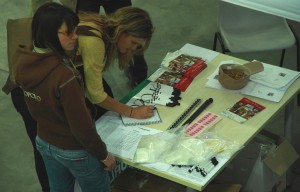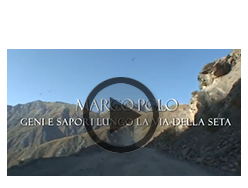25th October 2010: first results at Terra Madre 2010
MarcoPolo2010: A taste of the Silk Road
 The itinerant scientific project across seven nations, Marco Polo 2010, ends in Shanghai. Genetics and an innovative analysis of populations through ethnic groups, tastes, traditions and culture.
The itinerant scientific project across seven nations, Marco Polo 2010, ends in Shanghai. Genetics and an innovative analysis of populations through ethnic groups, tastes, traditions and culture.
Around 14,000 km travelled and over 700 samples collected to study the genetic make-up of populations and of taste. The Marco Polo 2010 Expedition- Along the Silk Road finished on 12th September when the scientific team returned to Trieste. The group of geneticists had set off from the city on a trip across seven nations – Georgia, Azerbaijan, Turkmenistan, Uzbekistan, Tajikistan, Kazakhstan and China – to reach its final destination in Shanghai. The researchers were searching for the answers to a number of different questions. Why do certain areas of the world prefer certain foods and flavors, while other areas have completely different tastes? Is it a question of the availability of certain ingredients and local food production or is the production of those ingredients and foods conditioned by taste, or the sensory abilities of inhabitants of a certain area? To what extent do these abilities depend on habit and culture and to what extent are they dependent on characteristics decided by genetic inheritance? And, finally, what effects does this have on health?
“Science still doesn’t have definitive answers and to find them we need to measure food variance and physical health over a wide area and where genetic variance is equally wide,” explains Paolo Gasparini, scientific director of the project. “The Silk Road is one of the few routes where different populations have been mixing for centuries, and so this area provided the perfect choice for our purposes. Along this route there have been exchanges of culture, spices and products but also of genes thanks to factors such as migration and migrant settlement. Remember that there is proof of this in the incidence of Behçet‘s disease, an inflammation of blood vessels which probably has immunogenetic causes. The areas with the highest prevalence of the disease are to be found on the Silk Road.”
The project was conceived and created by the IRCCS Burlo Garofolo, Sissa Medialab and the Terra Madre Foundation, in collaboration with the Autonomous Region of Friuli Venezia Giulia, AREA Science Park, and the University of Trieste’s Department of Reproductive Science and Development. Now that the travelling phase of the project is over, the real science has begun with the data collected now undergoing analysis at the Laboratorio di Genetica Medica dell’Ospedale Burlo Garofolo and the CBM.
Early outcomes of taste tests
Recent weeks were spent working on the analysis of data in the Laboratory of Medical Genetics, Hospital Burlo Garofolo and the Consortium for Molecular Biomedicine in Trieste. Taste is the most deciding factor in food choice. The perception of the four fundamental tastes (sour, salty, sweet and bitter) in all humans is related to genetic factors. As a general rule there is a preference for sweet and an aversion to bitter. Our preferences are also based on genetic characteristics: the correlation between taste and genetics is a rich area for modern research which can help us better understand food traditions and culture.
“Already,” says Gasparini “the findings are extremely interesting. The first results seem to confirm our instincts in the field, specifically that from Azerbaijan onwards there is a very high percentage of ‘supertasters’ in the bitter taste test, by which we mean people who have a very strong perception of bitter tastes. This type of test is related to the genes involved in taste: the genes on which our food preferences are based. For example, in Pamir the percentage of supertasters recorded was 37%, extremely high when you consider that the average in Europe is somewhere between 7% and 15%. This could explain why these populations prefer cuisine where the dominant tastes are sweet.”
In detail, supertaster among those samples were distributed as follows: 10% in Georgia, 13% in Azerbaijan, 18% in Uzbekistan, 17% in Kazakhstan, 31% in Tajikistan, indicating a clear gradient from West to East. The data of Turkmenistan are being developed. Similar samples were taken in China. Likewise there is a similar gradient for west to East related to some food preferences, e.g. for barley, not especially popular in Georgia and Azerbaijan, indifferent in Central Asia and instead appreciated in Tajikistan.
“As far as bitter taste is concerned,” the project director continues, “food contains various compounds which stimulate perception. From the 1930s onwards, various studies have shown that the inability to perceive the bitter taste varies from population to population with a minimum of 3% in West Africa to over 40% in India. People who are the most sensitive to bitter tastes tend not to choose foods such as cruciferous vegetables, high in thioureas, like cabbage, broccoli, Brussels sprouts, turnips, or foods containing caffeine, quinine, isohumulone (the bitterness in beer) and naringin (grapefruit). They are also more sensitive to the perception of spicy and fatty flavours. Today, we know that other genes are involved, as well as those related to bitterness, in the choice of various foods and that the role of smell, along with sight and sound, is, however, important in the choice of food or whether we find it appetizing.”
Not only taste
The research on the populations encountered also included audiometric tests, colour perception and olfactory testing, and observation of physical features. A relevant weight related to environmental and cultural factors has emerged from the olfaction test. For example, talking about the scent of orange: negative results always reported the smell of pineapple, excluded the ones in Tajikistan, where the orange smell was confused with the blackberry, a typical product of that territory. Apart from the raw statistics,” says Pio D’Adamo, an applied genetics biologist, “we’re really happy to have created a network of contacts in these countries, which, if need be, will allow us to increase the number of samples to analyze. We’ve now uploaded almost all the data in Trieste and are working quickly on the analyses.”
Paolo Di Croce, Secretary General of the Terra Madre Foundation, explains: “Terra Madre focused on the sensory education part of the project, a fundamental topic for us. Working with Marco Polo 2010 we set up three national meetings along the route, in Azerbaijan, Georgia and Kazakhstan, which for the first time brought together academics, farmers, journalists, students and cooks in these countries. The expedition’s passage through these nations symbolically united all the various points of the Terra Madre network and acted as a catalyst for the development of national Slow Food networks. We are very interested in the results of the research: to understand how cultural memory has an effect on, through evolution over thousands over years, the food produced and consumed today, along with genetics, and how it contributes to awareness of, and pride in, the flavours and knowledge which are under threat from large-scale agri-food distribution”.
Accompanying the scientists on their mission was a team of science communication professionals: writers, journalists, science museology and education experts, photographers, video operators and multimedia developers. “Under the direction of Sissa Medialab, we also wanted to create television programmes, scientific and photographic reportage, and multi-media educational kits,” says the CEO of the company, Enrico Balli. “The whole mission from the scientific planning, the expedition itself and the later analysis has been carried out under the public gaze, as people have been able to follow each step of the journey on our internet travel blog. This has made it possible to turn an important scientific research expedition into an interactive and involving project for science communication.
Photos, videos and a diary of the trip are available from the website www.marcopolo2010.it.
Marco Polo 2010 enjoys the support of Domori, Eppinger, Pool Pharma and Meta Mondo, who also gave technical support for all the travel arrangements, and the collaboration of Canon Italia and Cividin Viaggi. The Municipality of Trieste and the Italian Pavilion at the 2010 Shanghai Expo are sponsors. Thanks are also due to the Consorzio di Biomedicina Molecolare (Consortium for Molecular Biomedicine) – CBM, the Italian Embassy in Azerbaijan, the Italian Embassy in Kazakhstan, the Italian Embassy in Turkmenistan and the Italian Embassy in Uzbekistan.
Tests performed
Marco Polo 2010 proposed to analyze the taste perception of populations along the Silk Road and to compare the results with data related to the enogastronomic traditions of these populations and to the incidence of common pathologies such as obesity, diabetes and hypertension through a series of relatively simple tests. The Terra Madre communities, who have been actively involved in the project from its inception, took part in the following tests: 1) a bitter and salty taste test ; 2) a questionnaire about food likes with ratings for preference, using the same scientific parameters as the sensory education kit produced by Terra Madre; 3) an olfactory test using 12 different smelling substances ; 4) a colour test using the Farnsworth scale D-15; 5) an audiometric test to evaluate auditory function; 6) a short general questionnaire on physical health and certain aspects of lifestyle, such as the consumption of tea and coffee ; 6) the taking of a saliva sample from which to extract DNA for genetic analysis.
The itinerary
– Departure Trieste 17th July travelling through Greece and Turkey(Istanbul)
– Georgia 26th July – 3rd August (Kutaisi, Tiblisi)
– Azerbaijan 4th-8th August (Baku, Sis)
– Turkmenistan 9th-13th August (Türkmenbaşy, Asghabat, Mary)
– Uzbekistan 14th – 20th August (Bukhara, Samarcanda, Tashkent)
– Tagikistan 21th-28th August (Zeravshan, Dushanbe, KalayKuhm, Khorog)
– Return to Uzbekistan 29th-31th August
– Kazakhstan 1st-5th September (Chimkent, Almaty)
– China 6th-11th September (Urumqui, Shanghai)
Torino, 25th October 2010
Press office
Leo Brattoli – Francesca Iannelli
phone. 040 3755221/5189
cell. 335 1236284 / 338 5368101





[…] is the original post: MarcoPolo2010 » Blog Archive » 25th October 2010: first results at … Share and […]